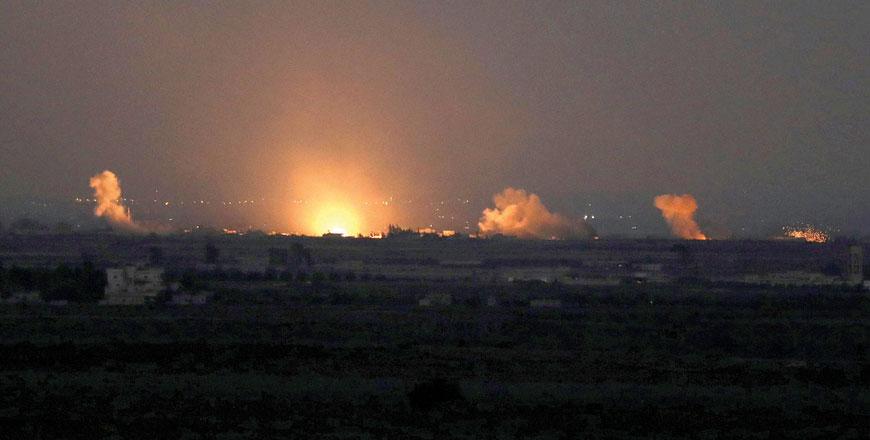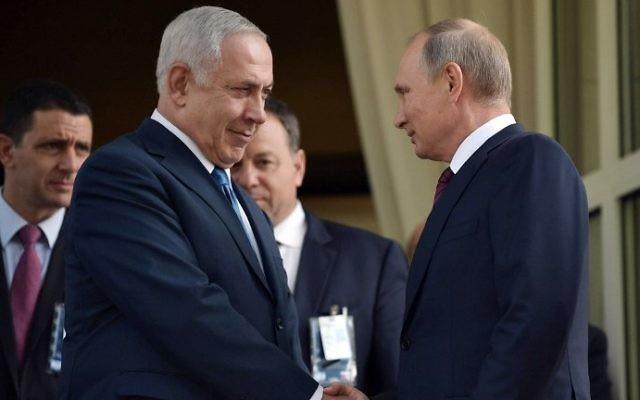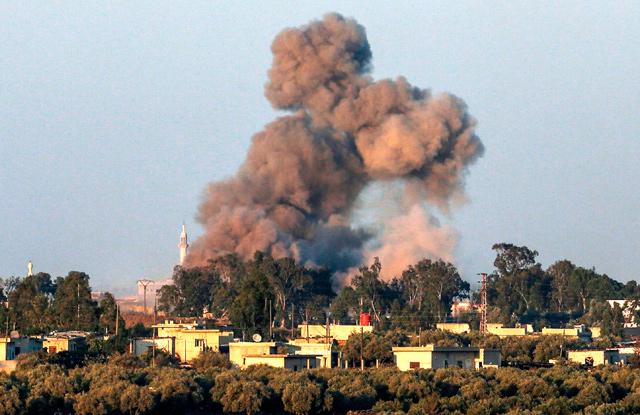You are here
Russia says Iranian forces pulled back from Golan in Syria, Israel unsatisfied
By Reuters - Aug 02,2018 - Last updated at Aug 02,2018

In this file photo, fire follows an explosion at the Syrian side of the Israeli Syrian border as it is seen from the Israeli-occupied Golan Heights on July 26 (Reuters photo)
MOSCOW/OCCUPIED JERUSALEM — Iranian forces have withdrawn their heavy weapons in Syria to a distance of 85km from the Israeli-occupied Golan Heights, TASS quoted a Russian envoy as saying on Wednesday, but Israel deemed the pullback inadequate.
Backed by Russia, Iran, and Lebanon’s Hizbollah, Syrian President Bashar Assad has retaken territory in southwestern Syria from rebels, closing in on the Golan.
Moscow has sought to reassure Israel by saying it wants only Syrian forces to deploy on or near the Syrian-held Golan. Israel, however, insists that forces controlled by Iran, its arch-foe, exit Syria entirely now the civil war there is ending.
“The Iranians withdrew and the Shiite formations are not there,” TASS news agency quoted Alexander Lavrentiev, President Vladimir Putin’s special envoy to Syria, as saying.
Lavrentiev said Iranian service personnel whom he described as advisors could be among Syrian army forces who remain closer to the Israeli border.
“But there are no units of heavy equipment and weapons that could pose a threat to Israel at a distance of 85 km from the line of demarcation”, Lavrentiev said.
An Israeli official deemed such a pullback insufficient.
“What we have laid down as a red line is military intervention and entrenchment by Iran in Syria, and not necessarily on our border,” Regional Cooperation Minister Tzachi Hanegbi told Israel Radio, citing the longer-range threat posed by Iranian missiles or drones positioned in Syria.
“There’ll be no compromises nor concessions on this matter.”
Last week an Israeli official, who spoke on condition of anonymity, said Russia had offered to keep Iranian forces at least 100km from the Golan Heights ceasefire line.
Israel rejected the offer, which was made during a meeting between Prime Minister Benjamin Netanyahu and visiting Russian Foreign Minister Sergei Lavrov. In an apparent riposte, Russia’s ambassador to Israel, Anatoly Viktorov, said on Monday that Moscow could not compel Iran to leave Syria.
But Viktorov also signalled that Russia would continue to turn a blind eye to Israeli air strikes against suspected Iranian and Hizbollah arms transfers or emplacements in Syria.
Hanegbi said Israel wanted to prevent Iran and Hizbollah from effectively extending their Lebanese front against it.
“We are not ready to see a new Hizbollah front on our northern border between Israel and Syria. This is something that is dangerous. This is something that, if we don’t prevent it today, when still at its outset, will a exact a heavy price of us down the line,” he said.
Related Articles
OCCUPIED JERUSALEM — Israel signalled on Sunday that it would keep up military strikes across its frontier with Syria to prevent any encroac
MOSCOW — Russia will deploy its military police on the Golan Heights frontier between Syria and Israel, its defence ministry said on Thursda
BEIRUT — Israel said it shot down a Syrian warplane that crossed into the occupied Golan Heights on Tuesday, but Damascus said the jet was f




















